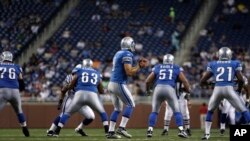The U.S. Federal Communications Commission (FCC) on Tuesday will vote on whether to eliminate a decades-old rule that has prohibited pay-TV providers from airing some home sports games, such as NFL football games, if the tickets to those games did not sell out.
Four of five FCC commissioners, including Chairman Tom Wheeler, have publicly indicated support for ending the policy, which is known as a sports blackout rule and is backed by the broadcasters and the National Football League.
The 1975 rule, originally meant to ensure that television broadcasts of sports games did not hurt local ticket sales, has faced mounting criticism that it was outdated.
The policy has banned cable and satellite provides from airing sports games in their home markets if a league or a team requires that all or most of the tickets be sold before the game can be shown on TV.
If the rule is repealed, sports leagues such as the NFL, broadcasters and cable and satellite companies could still privately negotiate blackout agreements. And the FCC has said that it is often such private agreements, and not the commission's rules, that prompt home game blackouts.
Only two NFL games, or less than 1 percent, were blacked out as a result of the rule last season and none so far this year, according to the NFL. In several instances, some businesses helped avoid blackouts by buying blocks of unsold tickets.
“The sports blackout rules are a bad hangover from the days when barely 40 percent of games sold out and gate receipts were the league's principal source of revenue,” Wheeler wrote in a recent newspaper opinion piece, saying the policy hurt fans.
“The NFL no longer needs the government's help to remain viable,” Wheeler wrote in USA Today Sept. 9.
The NFL and the broadcasters have warned that without the blackout rule, popular professional football games may become available only to those who pay for cable and satellite service instead of free over-the-air television.
Democratic Commissioner Mignon Clyburn, as acting chairman at the time, moved to consider the repeal of the rule in December. Republican Commissioners Ajit Pai and Michael O'Rielly have also publicly called for the rule's elimination.
“I don't believe the government should intervene in the marketplace and help sports leagues enforce their blackout policies,” Pai said in a speech last month. “Our job is to serve the public interest, not the private interests of team owners.”
The rules up for elimination are unrelated to some high-profile longer-lasting blackouts that are prompted by disagreements over the fees that TV operators pay programmers to carry their channels, such as the one this summer between CBS and Time Warner Cable.





